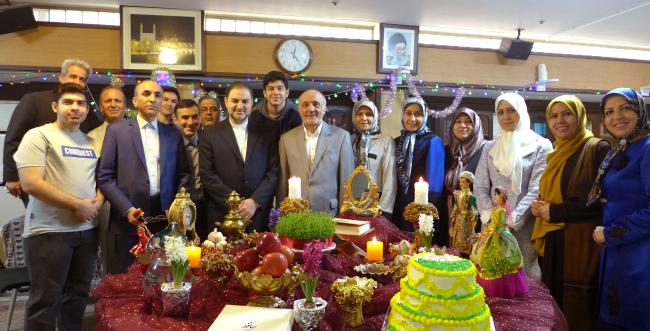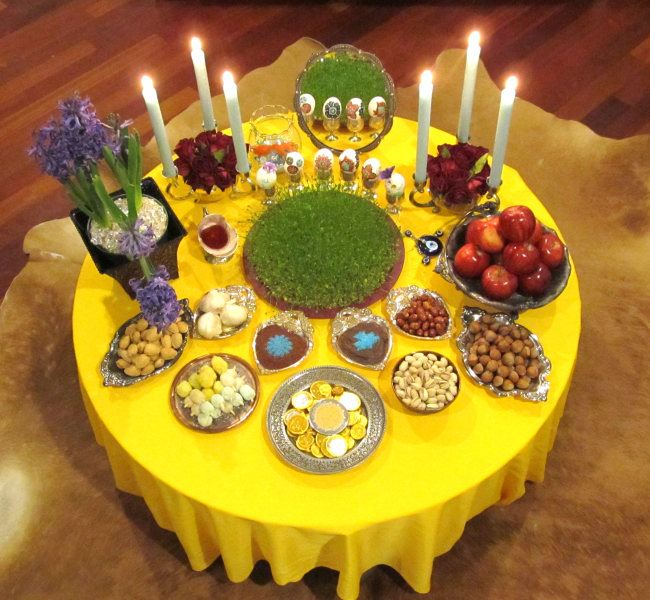A table full of adornments -- including the Quran, lit candles, an oval mirror, green wheat sprouts and glittering coins -- brightened the ambiance at the Iranian Embassy last week.
The ornaments were the centerpiece of the embassy’s Nowruz celebration, Iran’s primordial festival marking the onset of spring, which is observed annually on the first day of the Iranian calendar on March 21.
For the diplomatic mission, the festivities were even more meaningful this year, as Iran cast off the yoke of international sanctions following the historic 2015 nuclear deal and more investment is flowing into the Middle East powerhouse.
Nowruz marks life’s rebirth, fertility, vitality and virility after winter, according to the embassy’s cultural affairs division. Since time immemorial, the holiday has been commemorated in Western Asia, Central Asia, the Caucasus, the Black Sea Basin and the Balkans among Persian and Turkic peoples, with records stretching back more than three millennia.

Iranian Ambassador to Korea Hassan Taherian (center), diplomats and their families celebrate Nowruz at the embassy in Seoul on March 21. (Joel Lee/The Korea Herald)
In modern times, Nowruz is performed in Iran, Iraq, Afghanistan, Kazakhstan, Kyrgyzstan, Uzbekistan, Azerbaijan, Albania and across Europe. With the Iranian diaspora spreading wide, the festival has become so significant that Canadian Prime Minister Justin Trudeau and American President Donald Trump recently offered celebratory remarks to ethnic Iranians on the occasion of Nowruz.
At a ceremony at the embassy in Seoul on Tuesday, Iranian Ambassador to Korea Hassan Taherian, diplomats and their families jubilated the event in warmth and gaiety.
“I tell you that Nowruz is one of the most important celebrations in Iran,” Taherian told The Korea Herald. “It means ‘New Day’ literally, and similar to Korea’s Seollal or Chuseok, Iranians get together with their extended families and relatives, and elders endow the young ones with gifts.”
Noting both Iranians and Koreans respect their elders, the envoy explained such tradition comes from Islam in Iran, as compared to Confucianism in Korea.
This year is a year of cultural exchange between Iran and Korea. The 2017 Silk Road Korea-Iran Cultural Festival was held in Isfahan from March 11 to 13 through the cooperation of Isfahan and Gyeongju municipalities. The event featured Korean music and art, with some 200 Korean performers and politicians in attendance.

A “sofreh haft-seen” table is decorated with objects including the Quran, lit candles, an oval mirror, a bowl of vinegar, hyacinth flowers, colored eggs, glittering coins, green wheat sprouts, wild olives and garlic (Mandana Asadi/Wikipedia)
In Korea, various exhibitions showcasing Iranian paintings and calligraphy, music, handicrafts and films are being planned this year.
With the abrogation of sanctions following the milestone accord on capping Iran’s nuclear development program in 2015, the country presents new opportunities for trade and investment, the ambassador highlighted, adding three agreements were signed this year between Iranian and Korean companies.
In December last year, Daelim Industrial won a $2 billion contract from the Esfahan Oil Refining Company to upgrade the petroleum refineries, and Hyundai Heavy Industries clinched a $650 million deal to build 10 ships for Iran’s state-owned shipping companies, the Islamic Republic of Iran Shipping Lines. Hyundai will build four container ships and six petrochemical carriers and deliver them by mid-2018.
SK E&C recently won a $3.6 billion contract to construct and operate six gas power plants across Iran cooperating with Turkish firms.
“This year, we expect increased partnership with, and engagement from, Korean companies in various infrastructure and construction projects, particularly in building hospitals, oil, natural gas and petrochemical refineries, railroads and steelmaking plants,” according to the diplomat.
By Joel Lee (joel@heraldcorp.com)







